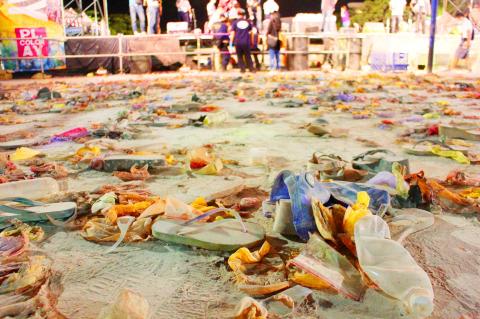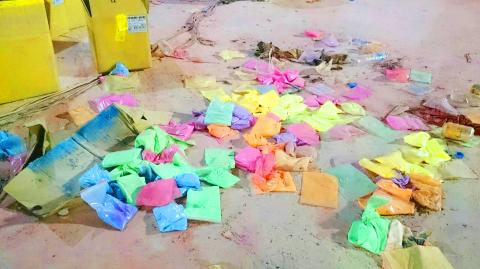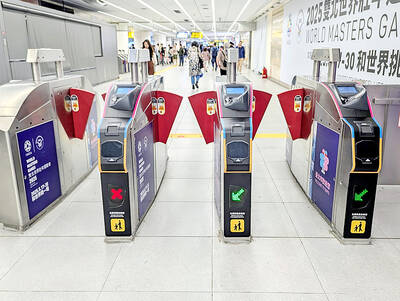Taipei is suspending all use of powder and dust products at public events and is considering a general ban on all combustible powders and dust products, Taipei Mayor Ko Wen-je (柯文哲) said yesterday.
The comments were in response to reporters’ questions on Ko’s stance on the matter after Premier Mao Chi-kuo (毛治國) announced the temporary suspension of the use of colored powder in public events while safety issues are investigated.
A dust explosion on Saturday at Formosa Fun Coast in New Taipei City started a fire that injured hundreds of people, officials said.

Photo: Huang Chieh, Taipei Times
Ko made the statements at a lunch hosted by Democratic Progressive Party Legislative Yuan hopeful Wang Ting-yu (王定宇) in Tainan’s Yongkang District (永康).
Suspending the use of a product after an emergency before looking into what can be done better is standard operating procedure, Ko said, adding that if the use of powder products is allowed in the future, they must be noncombustible.
Separately, Kaohsiung Deputy Mayor Derek Chen (陳金德) said that while he had prohibited the use of colored powder during his tenure as head of the municipal government’s Environmental Protection Bureau two years ago, it was over environmental concerns.

Photo: Huang Chieh, Taipei Times
Significant support in 2013 for a “Color Run” in Taipei and Taichung led to plans for one in Kaohsiung last year.
However, the bureau’s decision led to its cancelation.
In light of Saturday’s incident, applications for events in Kaohsiung that would use colored powder will not be approved, Chen said, adding that private events should not use such powders to improve safety.
Chen said Kaohsiung Mayor Chen Chu (陳菊) had spoken with New Taipei City Mayor Eric Chu (朱立倫) about the issue and pledged that Kaohsiung was prepared to aid patients.
Kaohsiung Chang Gung Memorial Hospital and the E-Da Hospital had taken in three patients who were transferred from northern Taiwan, Chen Chin-te said.

A magnitude 6.4 earthquake struck off the coast of Hualien County in eastern Taiwan at 7pm yesterday, the Central Weather Administration (CWA) said. The epicenter of the temblor was at sea, about 69.9km south of Hualien County Hall, at a depth of 30.9km, it said. There were no immediate reports of damage resulting from the quake. The earthquake’s intensity, which gauges the actual effect of a temblor, was highest in Taitung County’s Changbin Township (長濱), where it measured 5 on Taiwan’s seven-tier intensity scale. The quake also measured an intensity of 4 in Hualien, Nantou, Chiayi, Yunlin, Changhua and Miaoli counties, as well as

Credit departments of farmers’ and fishers’ associations blocked a total of more than NT$180 million (US$6.01 million) from being lost to scams last year, National Police Agency (NPA) data showed. The Agricultural Finance Agency (AFA) said last week that staff of farmers’ and fishers’ associations’ credit departments are required to implement fraud prevention measures when they serve clients at the counter. They would ask clients about personal financial management activities whenever they suspect there might be a fraud situation, and would immediately report the incident to local authorities, which would send police officers to the site to help, it said. NPA data showed

ENERGY RESILIENCE: Although Alaska is open for investments, Taiwan is sourcing its gas from the Middle East, and the sea routes carry risks, Ho Cheng-hui said US government officials’ high-profile reception of a Taiwanese representative at the Alaska Sustainable Energy Conference indicated the emergence of an Indo-Pacific energy resilience alliance, an academic said. Presidential Office Secretary-General Pan Men-an (潘孟安) attended the conference in Alaska on Thursday last week at the invitation of the US government. Pan visited oil and gas facilities with senior US officials, including US Secretary of the Interior Doug Burgum, US Secretary of Energy Chris Wright, Alaska Governor Mike Dunleavy and US Senator Daniel Sullivan. Pan attending the conference on behalf of President William Lai (賴清德) shows a significant elevation in diplomatic representation,

The Taipei MRT is to begin accepting mobile payment services in the fall, Taipei Rapid Transit Corp said on Saturday. When the company finishes the installation of new payment units at ticketing gates in October, MRT passengers can use credit cards, Apple Pay, Google Pay and Samsung Pay, the operator said. In addition, the MRT would also provide QR payment codes — which would be compatible with Line Pay, Jkopay, iPass Money, PXPay Plus, EasyWallet, iCash Pay, Taiwan Pay and Taishin Pay — to access the railway system. Currently, passengers can access the Taipei MRT by buying a single-journey token or using EasyCard,